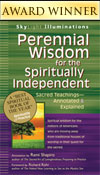
Spirituality is not just about what you believe or don't believe, it's about how you believe. Who Is My God? is a tool for discovering and exploring your own unique spirituality.
Created by the Editors at SkyLight Paths
Paperback
6 x 9, 160 pp | 978-1-59473-014-6
The Innovative Guide to Spiritual Self-Discovery
Your Spiritual Identity is an undeniable part of who you are—whether you’ve thought much about it or not, and whether you consider yourself religious or not. Spirituality is not just about what you believe or don’t believe, it’s about how you believe—how you approach the ultimate questions and mystery of life, and what you think those questions are.
Who Is My God? is a tool for discovering and exploring your own unique spirituality. You can take the Spiritual Identity Self-Test™ to find out how:
- Your Spiritual Type™ (how you believe)
- Your Tradition Indicator (what you believe)
- Your Spiritual Identity
And, when you learn more about your Spiritual Identity from the results of the self-test, you can continue your own spiritual search by using the descriptions of twenty-eight different spiritual traditions followed in America today—from Buddhism to Roman Catholicism, from Sufism to New Consciousness. For each of them, there are “People You Should Know” who are representative of that tradition, specific suggestions for further exploration, and contact information. Here is a guide to help you walk the path that is your way.
Attention: Spiritual directors, professional counselors, and clergy of all faiths and denominations. Who Is My God? is a proven resource for beginning spirituality conversations, suitable for a variety of settings. An ability to discuss religion—your religious background and beliefs—is essential for psychological, spiritual, and emotional growth.
“Diversity and democracy have changed the way people seek, worship, and find God. With so many paths and traditions to freely choose from, how is each individual to know what will genuinely work? Who Is My God? is a valuable aid to anyone seeking a spiritual life today. It gives the reader concrete ways of determining one’s unique needs and temperament on the path. Better yet, it provides excellent suggestions for further reading, study, and community.”
—Elizabeth Lesser, cofounder, Omega Institute; author of
The Seeker’s Guide: Making Your Life a Spiritual Adventure
“A handy resource.... Celebrates religious diversity ... and posits the real value of learning from faiths other than your own.”
—Spirituality & Health
“There was a time when our spirituality was determined by the religion we were born into. Nowadays, however, our spirituality is often determined by a personal quest as an adult—a literal soul search—where seekers look within, rather than outward, toward the family structure to determine their beliefs and spiritual practice. This inward quest is not an easy one, and can often lead to confusion, disassociation from all traditions, or years of dabbling without the rewards of transformation or spiritual maturity. In an attempt to lead readers through this daunting task, the editors of SkyLight Paths Publishing assembled this excellent guidebook and questionnaire.
Readers who are wary of superficial self-help spiritual writing need not worry. This is a sourcebook of integrity, not a glorified Glamour magazine quiz. By completing a comprehensive questionnaire, readers can actually glean useful information about their personal spiritual values. After compiling the results of the questionnaire, readers are then advised on which existing traditions make the best matches with their beliefs. From there the guidebook offers overviews and resources for numerous Eastern and Western traditions, including Hinduism and various forms of Buddhism. It also addresses what it calls ‘New Movements,’ such as New Consciousness Spirituality and Unity, as well as ‘Rediscovered Traditions,’ including Celtic and Wiccan spiritualities. One caveat: this is best used as a guidebook for seekers. Those who are already set on their religious paths may find it less useful, although it could be an affirming resource.”
—Gail Hudson, Spirituality Book Reviewer, amazon.com











